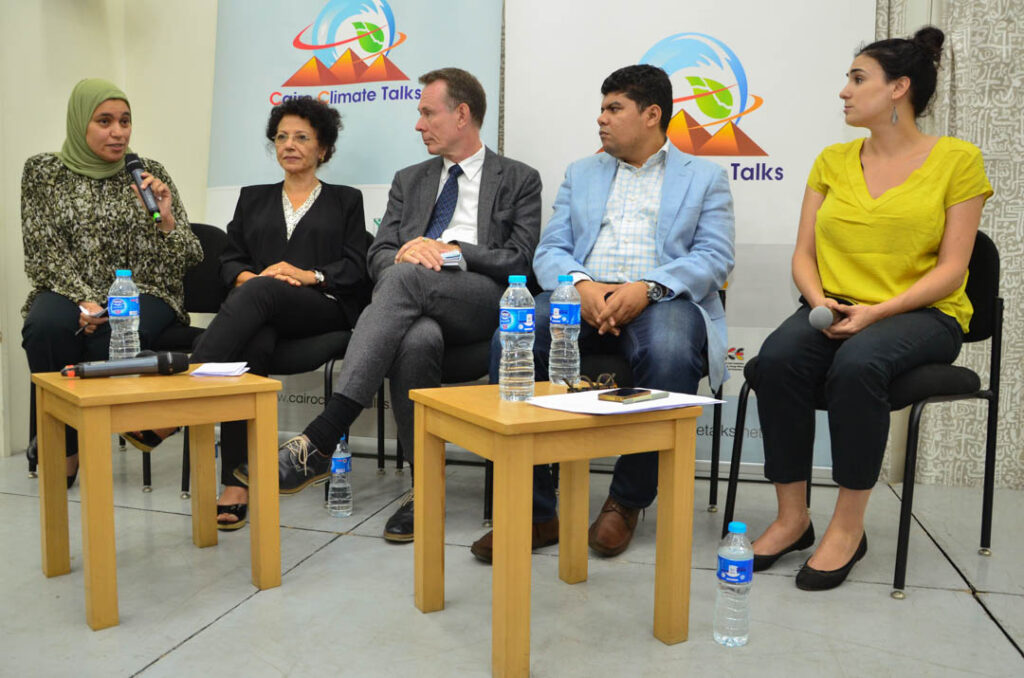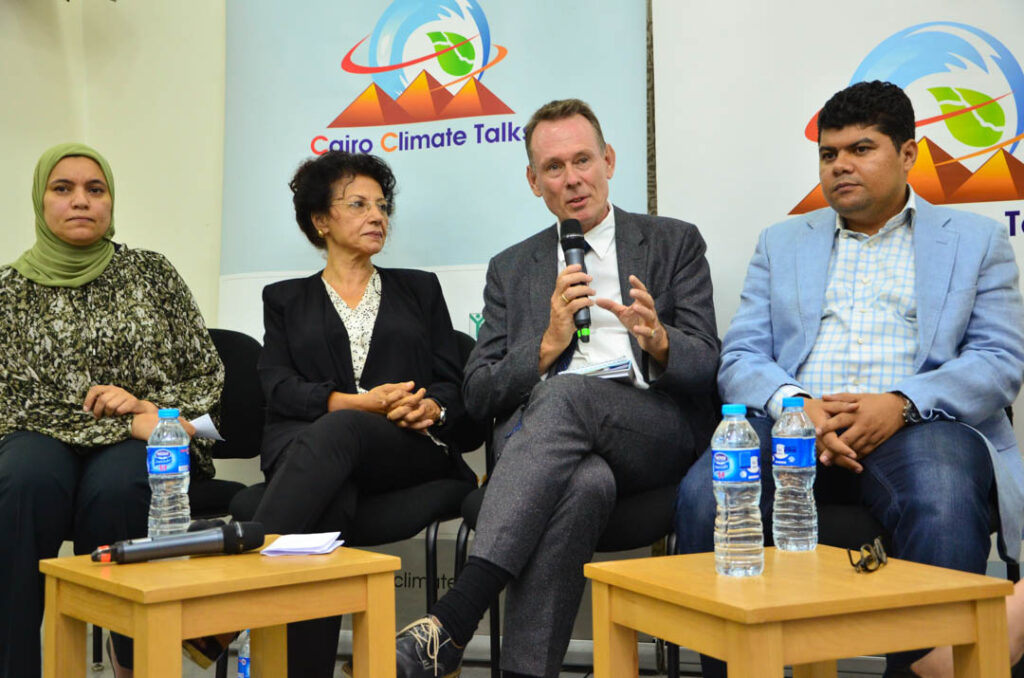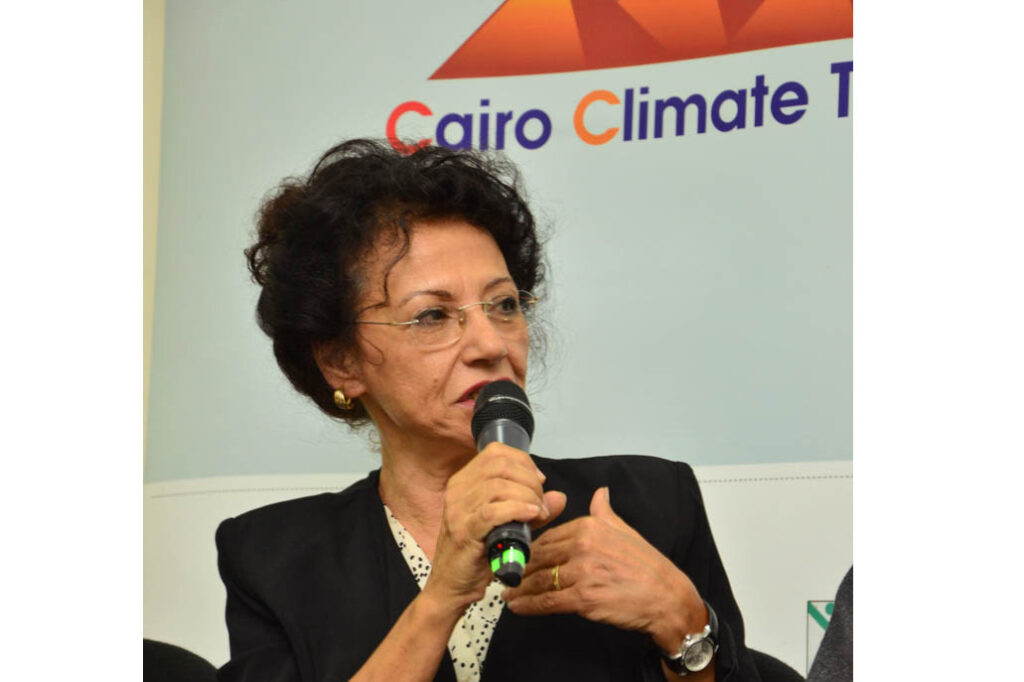Climate Change and Public Health
2017
Aug 29th
At German Academic Exchange Service (DAAD), 11 Al Saleh Ayoub Street, Zamalek, Cairo, Egypt.
According to the World Health Organization (WHO), the worldwide number of deaths caused by climate change is rapidly increasing, whether indirectly through diseases like malaria, diarrhea, malnutrition and respiratory diseases, or directly through extreme weather conditions like droughts, heat waves and floods. In Egypt, with its almost 100 million citizens, threats posed by extreme weather conditions are already a reality. In 2015, the Egyptian Ministry of Health registered more than 100 deaths due to extreme summer heat waves. In that same year, news reported that 11 citizens had lost their lives in the abnormal winter floods in Affouna village in Wadi El Natroun, Abou Homos and El-Rahamania. With a majority of its population living near water surfaces, Egypt is also very sensitive to climate-induced sea level rise. The WHO’s Climate and Health Country Profile on Egypt gives a rather pessimistic prognosis when it comes to indirect climate change impacts on Egyptians health: If the world continues with business as usual, around 1000 children are predicted to die annually from diarrhea by 2050. Between 2070 and 2100, floods are expected to affect 2.4 million Egyptian citizens.
“Climate change knows neither national not continental borders. It’s effects have become tangible for people everywhere around the globe, most recently in Houston in the U.S., but also in both our countries, Germany and Egypt. Germany experienced particularly long and pronounced heat waves in 2003, 2010 and 2015. It was in July 2015 that the highest temperature since the beginning of weather records in 1880 was measured, while August 2016 was identified as the hottest month in 136 years”, H.E Julius Georg Luy stated in his opening speech for the 49th Cairo Climate Talk “Climate Change and Public Health” at the German Academic Exchange Service (DAAD). He mentioned that interestingly, similar to what had happened in Egypt, the aforementioned hot summers were also marked by heavy rainfall: “Floods carried away a whole village in Bavaria in 2016, while Railway stations were flooded in Berlin in 2017. Such temperature fluctuations are associated with an increased biotropic load and are likely to occur more frequently in the future”, he alarmed. Luckily, governments around the world have started to
realize that climate change mitigation and adaptation strategies need to go hand in hand with health sector reforms and vice versa. H.E. strongly recommended more solution-driven projects like the GIZ “Adaptation to Climate Change in the Health Sector” program on behalf of the German Federal Ministry for Economic Cooperation and Development. He further encouraged better monitoring and long-term planning for health systems and communities to become more climate resilient as well as to react appropriately and in a timely manner to the negative effects of climate change on health.
“We thank the German embassy for all their efforts in providing a platform like Cairo Climate Talks that has facilitated experts’ discussions on climate pressing issues since 2011”, Mr. Sherif Abdelrehim, Head of Climate Change Department at the Egyptian Environmental Affairs Agency (EEAA), greeted Cairo Climate Talks and the audience in his opening remarks. He emphasized on how instrumental those discussions are in all developing countries lacking the infrastructures to ensure sufficient food, water and health services in the heat of our changing climate. “Egypt’s Intended Nationally Determined Contribution has been submitted to the UNFCCC in 2015, a national council for climate change has been established in 2016 and the national adaptation plan has been proposed in 2017 in order to receive a grant from the green climate fund”, ensured Mr. Abdelrehim the EEAA’s efforts in making climate change adaptation at the top of the national agenda, as well as integrated into the national sustainable development strategy. He then underscored the role of the Non-Governmental Organizations and the private sector to further collaborate in increasing our national capacity to adapt to all the upcoming changes in the climate.
Mr. Saber Osman, Climate Change Adaptation Manager at the Egyptian Environmental Affairs Agency (EEAA), stressed on the importance of the Paris Agreement and he assured that in the EEAA’s efforts to spread awareness about climate change in the government, they lobbied in the parliament to accelerate the ratification process, which eventually took place in June of 2017. Furthermore, he said that a pressing topic as such requires both the top down and bottom up approaches; “From the top down angle, we’re putting the right framework, policies and strategies to the other ministries”, he then proceeded “For example, the EEAA is working to establish the first Egyptian climate change law to put caps on emissions in different facilities”. Furthermore, Mr. Osman announced their new strategy to encourage bottom up development; “In co-operation with the meteorological authority, we are developing an interactive map on climate change through monitoring the sea level rise”. He then explained that this map will provide useful information for other ministries and organizations to pinpoint the gaps and fill in the needs in different geographical locations. “The map is expected to be ready in a year”, he disclosed.
Dr. Hans-Guido Mücke, scientist at the department of Environmental Hygiene at the German Environment Agency and manager of the Collaborating Centre for Air Quality Management and Air Pollution Control at the World Health Organization (WHO), addressed the similarity between Egypt, Germany and the Netherlands in terms of their water-spread landscapes that require common forms of support mechanisms; “We all need to be prepared for precipitation, and to have stringent policies for coastal protection and functional drainage systems to prepare for long term disaster prediction”. He then underlined the role of research and surveillance to predict future health impacts, determine what can be avoided and prepare for the inevitable. “Monitoring needs to be established so you can follow up on some specific diseases in order to study the development of viruses and vector diseases”, he interpreted. He then urged the investment in health education, reflecting on Germany’s technique of
involving different kinds of climate change messages in schools to prepare students for abnormal events as well as build healthy habits in the society on a continuous basis.
Dr. Ragia Elgerzawy, Health and Discrimination Officer at the Right to Health Program at the Egyptian Initiative for Personal Rights (EIPR), stated that both infectious and noninfectious diseases will be magnified due to climate change. She explained that cardio and pressure disease rates will grow with the increasing temperature; “Diarrhea cases will be amplified, as it is more likely for pathogens to grow in warm water. A lot of children are already suffering; in fact, currently 30% of the children below 5 years are beneath the average weight and height, this percentage will drastically inflate if we don’t act”. She then further clarified how vector diseases like malaria, dengue fever, schistosoma and bilharzia might increase with the extended water surfaces. Dr. Elgerzawy then commented on the direct impact of air pollution on health due to the use of coal; “we should limit the use of coal as much as possible and entirely prevent cement factories construction in the domestic areas”. Lastly she wistfully conceded that environmental issues and climate change are not yet on the top of Egypt’s political agenda; “we need to educate, not only the parliament, but also the ministries and the government, we need more than good laws, we have laws, some of them are very good, some of them are improving, but the implementation is just not good enough to achieve the purpose behind them”, she concluded.
“In the Ras Ghareb flood events, we initially responded with mainstream aid measures for disasters”, expressed Dr. Nehal Hefny, undersecretary general for programs and projects at the Egyptian Red Crescent (ERC), “Through experience we realized that people there needed new antidotes for venoms of reptiles that never existed in this area before”, she advanced. Psychological support to families, and especially children, who were traumatized by these disaster incidents, was a new need that Dr. Hefny observed in Ras Ghareb. After 20 years of work on informal areas, ERC had some knowledge to share on Zeinhom and Dweika areas for anyone who wants to have similar health projects; “There are very high rates of Diarrhea and respiratory diseases, but they are often underrated and unlinked to climatic conditions. If those rates multiply in the future due to climate change, will the existing facilities be able to cover all the patients?” She admitted that very concerning questions are left unanswered: Are we preparing our communities for climate change complications? Are we disseminating information on simple infection control, health care and first aid methodologies among vulnerable people in order to deal with heat strokes and exhaustion situations? ERC had a heat stroke campaign in beaches and public transport areas, but how can one organization cover the needs of a population of 100 million people? Dr Hefny then proposed a new angle to look at how health problems can be offset; “Communities suffer from a problem, but they also have the solution”. She highlighted how powerful very simple measures can be when embraced by the communities themselves; those could include having healthy kitchens where people learn to use affordable materials to prepare healthy food that can limit malnutrition. “Those solutions must be documented, shared and spread. Efforts need to be mapped”, she determined.
Two needs were commonly pointed by all four panelists for both countries: Psychological impacts on children as well as neurological impacts on elderly as a result of natural disaster situations must be taken more seriously in both developing and developed countries. More symptoms monitoring, data gathering and knowledge sharing are crucial for the whole world to curtail, or hopefully avoid, the health impacts of climate change on humans as much as possible.
Emerging Tremds of Climate Change Impacts on Public Health – Dr. Hans Mucke
Health Sector in the Egyptian Climate Change Adaptation Strategy – Saber Othman
National Strategies for Ministry of Health to Offset the Impacts – Dr. Omaima
Public Health and Climate Change Risks and Resilience – Dr. Ragia El Gerzawy
Climate Change Adaptation and the Urban Society – Franziska Laue
Community Based Disaster Risk Reduction Focus on Climate Change – Dr. Nehal Hefny
Meet our Panelists
Dr. Nehal Hefny
Under-Secretary General for Programs and Projects at the Egyptian Red Crescent.
Dr. Ragia Elgerzawy
Health and Discrimination Officer at the Right to Health Program at the Egyptian Initiative for Personal Rights
Dr. Omaima Ezzedin Mohamed
Director of Public Health Management for Environmental Health
Dr. Hans-Guido Mücke
Scientist at the Department of Environmental Hygiene at the German Environment Agency and Manager of the WHO Collaborating Centre for Air Quality Management and Air Pollution Control
Meet our Moderators
Ms. Meredith Brand
Science Journalist
Venue / location
At German Academic Exchange Service (DAAD), 11 Al Saleh Ayoub Street, Zamalek, Cairo, Egypt.



Are you interested? Don’t miss out by registering to our events. We hope to see you there.
